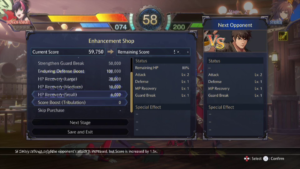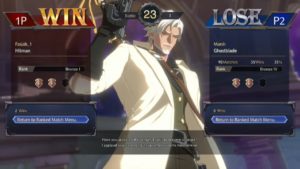Gaming as a service has become both a blessing and a curse during this past generation. While some games don’t hinder the overall experience with the point of squeezing every last penny out of the consumer, others are actually made with that greedy purpose in mind. Released in 2015, “Dungeon Fighter Online” has stood the test of time as a South Korea-born beat-em-up action game with role playing elements meant to connect players around the country, and, eventually, the world.
The game gained enough popularity to be adapted into an anime series, manga and, now, a 2.5D fighter with acclaimed developer Arc System Works at the helm. After taking part in the two open betas over the winter, I was left excited to see what the full “DNF Duel” package would provide and whether or not it could be my fighting game of the year.
Did I Complete “DNF Duel”?
Similar to other games in the genre, “DNF Duel” offers a good bit for the player to potentially enjoy from a single player perspective including an “Arcade Mode” with no character endings or real rewards, but the ability to choose their next opponent until the eighth bout. The real meat for single players is the game’s “Story Mode” where the player takes part in a visual novel presentation that showcases, usually, a single fight per chapter. Unlike other “Story Mode” offerings in fighting games where the entire narrative is a single experience, “DNF’s” requires the player to complete it with each character – a feat that should take over fifteen hours considering one playthrough alone usually takes nearly an hour. Unfortunately for gamers looking for a challenge in “Story Mode” won’t find it here.
Thankfully there is something to push players to the limit: “Survival Mode”. As the name suggests, “Survival Mode” sees how long the player can last while fighting back-to-back opponents in either sets of fifteen, thirty, or 100. The most interesting part of “Survival Mode” is the fact players can spend the points earned after every match to do things like up their character’s defense, restore a bit or bunch of health, and make MP regeneration a lot quicker; though only one choice can be made after each successful fight.
There’s also “Practice Mode” featuring a pretty hefty tutorial and, most importantly, a rather in-depth character tutorial for each fighter that includes some extensive combos. Online action is rather simplistic only featuring “Ranked” and “Player” options with the latter based around another lobby system that will have players standing around for minutes on end trying to get a fight. Though I haven’t finished “Story Mode” with all the characters or purchased things like avatars and gallery art, I spent a majority of my time (around twelve hours) duking it out online or attempting to get into a lobby to try out a random character against someone wise enough not to let luck choose their digital representative for the latest battle.
Did “DNF Duel” Live Up to the Hype?
Similar to “Granblue Fantasy: Versus”, Arc System wisely produced a game that is rewarding for gamers just wanting to mash buttons as well as those who enjoy learning a character’s repertoire & mastering it to the best of their abilities. The control scheme features light, medium, heavy (“Skill”) strikes, and “MP Skill” attacks associated with the controller’s face buttons. Underneath the character’s health bar is the “MP” meter that is solely dedicated to performing special attacks, i.e. Ranger throwing out his guns like boomerangs or Grappler rushing forward with shoulder tackle that can be amplified so it armors through whatever the opponent throws.
When a round starts, both fighters have a base of 100 MP. When an opponent is hit by “MP Skill” attacks, that fighter’s MP bar actually extends to a max of 200 MP. On the opposite end, if someone depletes their MP bar with special moves, their character enters an “Exhaustion” state where their attacks become less powerful and the amount of damage taken increases if they don’t block at the right moment.
Also taking a page out of “Granblue Versus” is the fact MP bar expense & restoration is based on how the player takes advantage of the control scheme. While simple inputs are standard for pulling off “MP Skill” attacks, there is the option of utilizing quarter-circle movements to perform those same “MP Skill” maneuvers with the full motion movements allowing for quicker MP bar restoration and the amount of MP spent lessened. Sadly there’s no way to turn off the simple input, so players may still perform the simple input instead of the quarter-circle motions that may or may not be detrimental to a player’s strategy.
Combo options are extensive, but the defense opportunities are not as plentiful. Players can block by either holding back on the movement button or holding the dedicated block button a la “GB: Versus”. By holding down the block button and pressing the movement button forward or back twice will allow a character to dash toward or away from an opponent that is, depending on the timing, very useful in closing the distance especially when facing a projectile-focused opponent.
Thankfully, if the player doesn’t get in like planned, immediately blocking to stop a counter-attack is not impossible. There’s also the ability to “Guard Cancel” and even perform a “Reversal” during an opponent’s combo string. But if someone is hit by the beginning of what will become an extensive combo, there is very little the player can do to stop the upcoming damage. Systems like combo breakers don’t exist in “DNF”, so expect to be juggled like crazy during most fights.
One of the potential reasons for a player pulling off what seems like an impossible combo is the “Conversion” ability. When a character takes damage from anything but “MP Skill” attacks, the portion of their health depleted is white. That white health can restore if the character doesn’t take damage. When hit with “MP Skill” maneuvers, an opponent’s taken health turns red and goes away completely. For players looking to extend combos, gamble with the potential of landing a big series of maneuvers, and/or immediately restoring their lacking MP by sacrificing their visible white health by turning it red can use the “Conversion” ability. “Conversion”, though it hinders a character’s overall health, can provide that single opportunity that puts an opponent in dire straits.
But even if a character has low health there’s a chance for a comeback courtesy of their “Awakening” maneuver. When a character is low of health (around twenty percent), they can pull off a high-powered “Awakening” attack after the execution of an “MP Skill” maneuver that both can mean the end of a round in one cinematic blow and be used once per round. There is a big negative in regards to using an “Awakening” attack especially if it doesn’t defeat the opponent: losing bonuses. Every character has moves and actions that will activate certain passive abilities or status effects on opponents like Trouble Shooter’s favorite beverage temporarily buffing his attack power and an adversary’s health slowly depleting due to being hit with several fire-based attacks respectively.
One of the biggest issues for some players will be the overall movement. Though this would be considered an anime fighter, the movement is closer to something like “Mortal Kombat 11” than even the somewhat critically panned “Guilty Gear Strive” that, too, slowed down the action compared to it contemporaries and predecessors. There is no ability to air dash and even the aforementioned running/dash options don’t feel as responsive as expected.
Online “Ranked” features the winning player gaining a badge that eventually raises someone’s overall rank if they win a certain amount of times in a row depending on their current ranking (“Bronze”, “Silver”, “Gold”, “Diamond”, “Terranite”, “Deity”). Unlike other Arc System games where the player fights the AI to get their initial rank online, players can just choose their base rank and see how it all works out. A great implementation in regards to waiting for “Ranked” fights is the ability to go into training, play through the tutorial, or enter “Arcade” or “Survival” modes.
“Player” matches, however, feature those annoying lobby systems Arc System games have become known for the past two generations. While walking around with an avatar, players who enter a room can occupy one of the four arcade cabinets in a lobby or spectate a current fight in hopes of getting in on the action if someone leaves their spot. Though every lobby shows the lowest rank of the player who runs the room, it doesn’t display the rank of every player in the room – meaning there’s a chance a “Bronze” level player will find themselves taking on a “Diamond” ranked gamer who decided to enter a lobby hosted by another “Bronze”-level fighter.
Thankfully, connection quality is mostly strong with rollback netcode preventing significantly laggy fights no matter where the opponent is in the world; though there will be noticeable frame rate drops/stuttering if the distance is greater than fighting someone from the other side of an ocean rather than the opposite end of their own country. On line’s biggest issue is the high failure rate of attempting to enter a room in the first few weeks since the game’s launch.
“DNF Duel” takes the adage “easy to play, hard to master” to heart like very few fighting games have before it with ridiculous attack power for characters across the board while providing rudimentary modes both offline and online with the latter having strong capabilities in regards to connection quality and not its lobby system.
Should You Play “DNF Duel”?
“DNF Duel” is majorly for those who love the wildest fights possible. The insanity that can come from almost any fight provides a fun experience even if a character is on the destructive end of an opponent’s sickest combo. Single-player-only players may not feel “DNF Duel” is worth both the monetary or time investment as there’s not much to do other than learning what each character has to offer.
As per the norm, fighting online will keep players, potentially, coming back for more; but will definitely make or break someone’s experience if they don’t care for being bodied by crazy combos aplenty. At an initial asking price of fifty dollars USD, “DNF Duel” won’t break the bank, but probably is better as a rental if possible to see if someone can get into the craziness of the base gameplay. For someone who does love this type of game, there are very few fighters out there as rewarding especially when pulling off the comeback of a lifetime when it seems you’re outmatched and outgunned.






